 |
 |
 |
 |

|
|
|
|
| |

|
| |
| Daniel Cheung, Godfather of HOFEX |
| 22nd Apr 2005 |
| Back |
| |
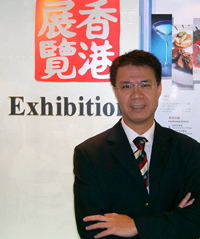 Daniel Cheung is the General Manager of Hong Kong Exhibition Services Ltd – and that’s no mean job. At the top since 2000 he’s seen the popular food and hospitality show HOFEX through SARS, through revolutions in terms of mainland visitor numbers and him and his team are gearing up for HOFEX 2005. GSA caught up with him in a rare quiet moment to find out just what goes into organizing such a huge event. Daniel Cheung is the General Manager of Hong Kong Exhibition Services Ltd – and that’s no mean job. At the top since 2000 he’s seen the popular food and hospitality show HOFEX through SARS, through revolutions in terms of mainland visitor numbers and him and his team are gearing up for HOFEX 2005. GSA caught up with him in a rare quiet moment to find out just what goes into organizing such a huge event.
I find him in the middle of a logistic dilemma – the incredibly popular HKICC (International Culinary Classic) competition that runs throughout the event, is oversubscribed. Already 380 chefs have applied and more are knocking at the door, despite the cut off day having come and gone. But while HOFEX doesn’t want to say no, they just don’t have enough workstations for that many chefs. What to do…?
Cheung is happy though. “It’s a good sign,” he smiles. Looking back at the first ever HOFEX in 1987, which took place in the Ocean Terminal car park, they were hosting around 200 exhibitors. This year, just eighteen years and 11 HOFEX's later, being a bi-annual event, numbers are hitting 1,800.
The sister show, FHA (Food and Hotel Asia), which runs on even years in Singapore, was the first event of this kind in Asia, launching five editions before HOFEX. When HOFEX was soft-launched at the 1986 FHA all the booths were sold out, heralding the addition of one of the region’s best-loved events. With the now infamous apple logo part of UK company Allworld (formerly Montgomery Network which has been organizing events for over a century) it is clear the professionalism and business ethics are solid.
“We don’t organise exhibitions simply to organise exhibitions,” says Cheung, “but to answer the needs of the industry. That is the way we expand our business.”
|
|
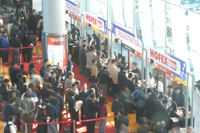 To begin with HOFEX was seen as a food and hotel show for western businesses. “We talked to Chinese restaurant food chains, chefs, supermarkets and they got that impression, that it was for gweilos – fine food, fine dining, cheese, wine – we aren’t selling that kind of stuff they told us. But now more and more Asian groups are joining the show, from Singapore, Malaysia, Korea, Taiwan, Thailand… To begin with HOFEX was seen as a food and hotel show for western businesses. “We talked to Chinese restaurant food chains, chefs, supermarkets and they got that impression, that it was for gweilos – fine food, fine dining, cheese, wine – we aren’t selling that kind of stuff they told us. But now more and more Asian groups are joining the show, from Singapore, Malaysia, Korea, Taiwan, Thailand…
“And we are gradually transforming HOFEX into a real food and hospitality show – not just for hotels but the whole hospitality industry. This year we are covering spas and golf clubs and other things like catering, government kitchens, hospitals, even school canteens.”
The spa section was a result of a survey done among exhibitors asking what elements they’d like to see in HOFEX in the future. This is where golf clubs, residential clubs etc also got their moments in the HOFEX spotlight.
The most popular event at HOFEX is a long-term one: the GM’s Forum. “It’s a very good forum,” says Cheung. “It is organised by the Hong Kong Hotels Association who organise this regional brainstorming forum in conjunction with HOFEX. It’s very well received by the GMs, and it’s a bit of an old boys’ club – they all know each other. It is a platform where they can gather together and feel free to share their experiences."
The event is smattered with big brand names of companies like IBM taking part. But it is also a great opportunity for small companies to get their feet in the door and get known. With less financial power and presence it is heartwarming to see that HOFEX makes a special effort to help these companies in several ways.
|
|
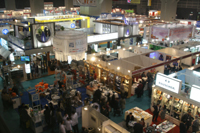 “We facilitate them to apply for SME Funds (Small and Medium Enterprise fund) whereby they pay half of the booth price only. It is a fund set up by Hong Kong government to help small companies because we are an international show, and exporting through the show helps the economy.” “We facilitate them to apply for SME Funds (Small and Medium Enterprise fund) whereby they pay half of the booth price only. It is a fund set up by Hong Kong government to help small companies because we are an international show, and exporting through the show helps the economy.”
HOFEX also extend that helping hand to smaller overseas companies by talking to overseas agents and getting them to enlist the support of the department of export promotions in their governments. “They are obliged to help their companies,” he says. “If we don’t take this initiative to help, people just wait and see. The smaller companies can’t afford to join the show. We support them with promotions, free publicity… Big companies use their money to buy more – for example CLP sponsor the HKICC using their financial strength to enhance their publicity.”
While HOFEX are interested in welcoming exhibitors from all over the world, the fastest growing segment is Mainland China. “Last year (during SARS we postponed 2003 to 2004) we registered over 2,300 Chinese buyers. They are mainly from southern China (Guangdong), Shanghai and some from Beijing. The reason why is our company also organises the largest food and hotel show in Shanghai. But HOFEX is a place where you can see new companies, new products. For companies who are able to join a China show they must already have some sort of presence. Too many of our top cream of Chinese buyers are not satisfied. They know the companies already. So to gain advantage and strengthen their company advantage they come to HOFEX. The China market is very competitive.”
"The Individual Travel Scheme has also helped this. More than thirty mainland cities are offering this free individual traveler scheme so that going to HOFEX is that much easier."
|
|
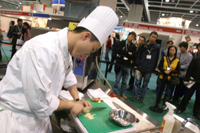 So the Chinese market is growing exponentially – how about the general success of the event. How is it actually possible to measure it? This is another challenging area for Cheung, due to the psychology of the Asian market. So the Chinese market is growing exponentially – how about the general success of the event. How is it actually possible to measure it? This is another challenging area for Cheung, due to the psychology of the Asian market.
“Every time I put out a questionnaire – confidential of course – asking how much business did you do and how much do you project in the next three to six months, but less than five per cent fill it out.
"First of all because it is sensitive. If they put down they did good business they are saying they are very easy to satisfy. So they say, 'so-so-lah, next time work harder and get more buyers, OK? Last year’s show was so-so, so give me a discount!'"
So Cheung has to look to different sources to get his … resources. He looks at confidential reports from various governments from whom exhibitors receive subsidies and have to complete an evaluation after the event. If they put down that it wasn’t such a good show then perhaps their government won’t help to send them next time, increasing the chance that the figures are real. He also checks in with trade councils and last, but certainly not least, he looks at return ratio, which in general stands at over an extremely gratifying 85 per cent.
|
|
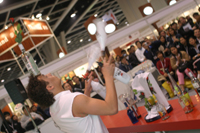 So the show works, it helps the trade world go round and whatever they may say, generally the exhibitors and buyers are happy. But just what does it take to organise this huge scale show? So the show works, it helps the trade world go round and whatever they may say, generally the exhibitors and buyers are happy. But just what does it take to organise this huge scale show?
“We start 18 months before the show,” he says, “organizing our EP (Exhibitor Promotions campaign) keeping all trade councils informed, picking dates, and we start the groundwork, persuading individual companies to join HOFEX. We ask governments to subsidize and we go out on a road show to promote the event. We promote and monitor sales and talk with partner associations.
“Eight months before the show we organise our VP – visitor promotions. We send out e-blasts and printed materials to buyers, we put publicity in trade magazines…
“We divide our staff into four major teams – the EP team; the VP team; Operations who work for eight months on floor plans, negotiate with the HKCEC (Hong Kong Convention and Exhibition Centre), arrange venue allocation, liaise with official contractors like booth designers, freight, security – all the nitty gritty; and the Events team who help some of the associations form seminars, organise committees to use the network and arrange a good panel of speakers etc.
“Even though it can be quite routine we are always looking at new elements each time – maybe new partners, for example, to make it bigger and better. We have got to keep the show sexy!”
And keeping that show sexy, at the top of the heap, is Cheung. “I am using a helicopter view to orchestrate the departments. I come up with some new ideas to keep the show innovative, and I streamline operations.”
|
|
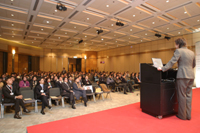 One of his new ideas is the HOFEX ambassador who assists with group registration. When lots of people are coming from one source, for example a hotel, the ambassador liaises with that group directly, preparing badges, collecting souvenirs, information packs and delivering essentials in advance – generally personalizing the experience and making it that much easier. One of his new ideas is the HOFEX ambassador who assists with group registration. When lots of people are coming from one source, for example a hotel, the ambassador liaises with that group directly, preparing badges, collecting souvenirs, information packs and delivering essentials in advance – generally personalizing the experience and making it that much easier.
Cheung’s view from the top doesn’t make him giddy – he’s not afraid of these kind of heights. He’s been doing this job for nigh on 25 years. There’s not much that can phase him, and it’s a good thing to have someone relatively unflappable in charge.
Looking back he has worked in insurance, in a travel agency, as a tour escort, and then ended up working at the first ever US National Trade Show in Beijing, and was taken on by conference giants Reed in 1983. He also helped the Hong Kong government organise the World Bank and International Monetary Fund meetings in Hong Kong the year of the handover. So the combination of travel agent, conference management, event management and exhibition management experience means that there’s precious little in HOFEX that he hasn’t come across before.
The genial man looks happy where he is, and then delivers a hard line which seems out of character, but which explains how he stays at the top when the pressure is mounting and the chips are down.
“Earthquakes don’t count!” he says.
“No matter how well you plan your event you will encounter many ad hoc problems arising all of a sudden. So I emphasise the need for skills – analyse the problems, come up with a number of solutions. How do you deal with problems, how do you solve them? Your choice of strategy is all-important. And time – otherwise you cannot complete the job – it will be a never-ending story.
“I have four different teams and I want to see results. Whatever happens, I don’t give a damn, I want to see results. I don’t mind helping them navigate, or complete a set of objectives but I set the objective, you get it done. Earthquakes don't count!”
|
|
Top tips
1 problem analysis – then come up with good solution
2 determination of objectives
3 choice of strategy
4 selection of support services – choose good contractors, pr firms…
5 scheduling of time
Key characteristics of PEO (Professional Exhibition Organiser)
Well-balanced character
Managerial qualities
Thorough knowledge
Selection of support services
Linguistic abilities
Broad education
Born communicator
Systematic worker
Determination to complete mission
|
| | | |
|
|
| |
|
|
|
|
| |
|
|
|
|
|
 |
 |
 |
 |
|


